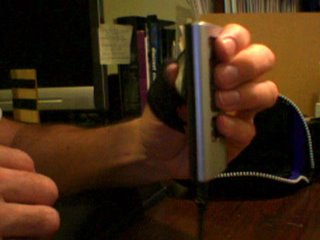I vaguely remember all the knashing of teeth that occured when the WIMP (windows, icons, menus and pointers) desktop replaced the terminal interfaces (UNIX, DOS). Apple did it first (oh, those eccentric Mac users) and then Microsoft followed (didn't they steal the idea...or perhaps Apple stole it from Xerox). Of course, today people think you are crazy if you are not using a windowed environment (and all the lawsuits finally went away). But, at the time, computer users could imagine a world without a terminal interface. And guess what, it is still there for those people who cannot be without it.

Picture of Typewriter
(from Wikipedia)
The obvious solution from human-computer interaction experts is that we will talk, poke and scrawl on our computers. They have been researching and predicting this for quite some time. I remember using MacInTalk on the Mac 10 years ago. However, even with the numerous new versions of speech recognition engines, we are still limited to quiet environments, one person at a time, and "no non-native American English speakers please!" As for handwriting recognition, you still have to write like my daughter is learning to in her 1st grade class (nice well formed letters), which is not very practical or fast. Increasing speed and writing cursive results in an instant drop in recognition accuracy.

Picture of a Twiddler keyer
(from Wikipedia)
So what are the other options? Well, the wearable computing geeks have been trying out all sorts of mobile chording keyboards and keyers. These have certainly been great prototypes of how to do data entry using one hand and on-the-go, however they have never received wide attention or adoption. This has been in part due to the fact that the hardware is tricky to setup and learn, but also because most users feel comfortable with the familiar QWERTY keyboard and using a computer while sitting at a desk.

Picture of an EkaPad in use
An exciting new option for the road warrior is the EkaPad (www.ekatetra.com), a 12-key, handheld pocket USB keyboard. This keyboard requires no flat desk surface and fits the hand in its naturally relaxed position. What is lost in two-handed typing speed is more than made up for in its ergonomics and ability for ubiquitous use by requiring only one hand, e.g., while walking a warehouse floor, operating machinery and automobiles. And this keyboard is simply plug 'n play (no drivers required) since it appears to the computer as a standard IBM or Mac USB keyboard.
see earlier blog, Cool Road Warrior Mobile PC Platform, 8/31/06.
The move to laptops challenged people to unchaining themselves from their desks, but not from the QWERTY keyboard. The move to tablets and PDA-sized computers is now challenging users to unchain themselves from QWERTY keyboards. It has to happen. It will happen...eventually.